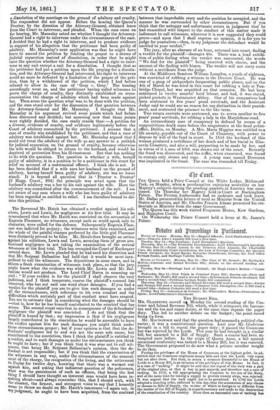The Reverend Mr. Hatch has obtained a verdict against his
soli- citors, Lewis and Lewis, for negligence at his first trial. It may be remembered that when ir. Hatch was convicted on the accusation of Eugenia Plummer, no witnesses, except such as could speak only to character, were called for the defence. Subsequently Eugenia Plum- mer was indicted for perjury; the witnesses were then examined, and the whole of the painful charges preferred by the little girl Plummer were distinctly proved to be false. Mr. Hatch then brought an action against his solicitors, Lewis and Lewis, accusing them of gross pro- fessional negligence in not taking the examination of the several witnesses at the first trial. This has occupied the Court of Exchequer several days. Mr. Lewis pleaded that he had used his discretion and that Mr. Serjeant Ballantine had held that it would be most inex- pedient to call the witnesses. The depositions in some cases, and in ethers a fresh examination of witnesses took place, so that the jay might know what the evidence was which Mr. Lewis and Mr. Bal- lantine would not produce. The Lord Chief Baron in summing up said : "If your verdict is for the plaintiff I shall observe the very judicious, and I think temperate, course the plaintiff's counsel has observed, who has not said one word about damages. If you find a verdict for the plaintiff you are to give him such damages as under all the circumstances, with reference to his own conduct and the difficulties which certainly. part of that conduct must have created. You are to estimate that in considering what the damages should be —that is, how far he has himself contributed to the mischief that has arisen. The second count says that in consequence of the defendants' negligence -the plaintiff was convicted. I do not think that the plaintiff is bound by that ; my impression is that if his negligence largely contributed to the conviction he would be amenable to have the verdict against him for such damages . you might think under those circumstances proper; but if your opinion is that that the de- fendants' negligence led to and was not the mere sole cause, but contributed to the conviction, then I think the plaintiff is entitled to ajerdict, and to such damages as under the circumstances you think he ought to have ; but if you think that it was wise not to call wit- nesses, that being Mr. Serjeant Ballantine's opinion, then the de- fendant is not responsible; but if you think that the examination of the witnesses in any way, under the circumstances of the conceal- ment of the charge, the resignation of the living, and the retirement to Poplar for twelve days, knowing that there was a warrant out against him, and asking that indiscreet question of the policeman, what was the punishment of such an offence, that being the last thing I should have thought an innocent man would have been in- quiring about—and always remember this, that I should wish, with the clearest, the firmest, and strongest voice to say that I honestly mean to throw no doubt on Mr. Hatch's innocence—I again say, in my judgment, he ought to have been acquitted, from the contrast
between that improbable story and the position he occupied, and the manner he was surrounded by other circumstances. But if you think that the unhappy and unfortunate errors in judgment that he had committed with respect to the conduct of this matter made it indiscreet to call witnesses, whatever it is now suggested they could prove—and upon that I shall express no opinion, it is for you to judge for yourselves—then, in my judgment the defendant would be entitled to your verdict."
The jury, after an absence of an hour, returned into court, finding a verdict for the plaintiff--damages 40s. There was a loud exhibi- tion of public feeling when the verdict was announced, the words " We find for the plaintiff " being received with cheers, and the amount of the finding with hisses. The verdict will not carry costs without a certificate from the judge.
At the Middlesex Sessions William Landon, a youth of eighteen, was convicted of robbing a witness iu the Divorce Court. He was one of a gang of pickpockets frequenting public places, and on the 4th of March he was tried in this court for robbing a lady at Tim- bridge Chapel, but was acquitted on that occasion. He had been sentenced to twelve months' hard labour, and had, it was stated, picked pockets in Westminster Abbey. One of his companions had been sentenced to five years' penal servitude, and the Assistant Judge said he could see no reason for any distinction in their punish- ment, and sentenced the prisoner to the like term. Two return convicts were sentenced, one to seven another to five years' penal servitude, for robbing a lady in the Marylebone-road.
An extraordinary case of conspiracy to defraud by means of a supposititious death came before the magistrates at the head police- office, Dublin, on Monday. A Mrs. Maria Higgins was entitled to a life annuity, payable out of the Court of Chancery, with power to dispose by will of the fund in court. In 1838 the husband of this woman produced a certificate of her death and of her burial in Glas- nevin Cemetery, and also a will, purporting to be made by her, and in virtue of it a sum of 5001. was drawn out of the court. Recently the fraud was discovered, and the coffin, when examined, was found to contain only stones and rags. A young man named Devereux was implicated in the fraud. The case was remanded till Friday.






























 Previous page
Previous page